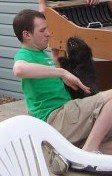The ELP: Ethnography Learning Paper (one pager)
Luke Schnickel
1. Placing theory into action, I find myself continually trying to accommodate, actuate, and view my practicum class as a place “where inquiry into culture takes place, where dialogue across cultural boundaries occurs” (Fecho 371). My classroom interactions and processes have driven me to inquire into language itself, through the eyes and written works of established Standard English and the multiple discourses presented in school settings. This inquiry has led to further inquiries which now form the basis of my case study.
Case Study Inquiry- Can a teacher maintain a class with multiple discourses in relation to Standard English learning and home dialect, and if so, how?
Inquiry Questions
- What are students’ attitudes and reactions to Standard English?
- How, and when, do students replace S.E. for home dialect (and vice versus)?
- How can a teacher enable a student “to consider and use language in diverse ways (Fecho 368)?
- What is the impact of language upon, and in, a diverse classroom?
- How does language, both S.E. and home dialect complicate student identity?
2. List of Primary Sources
- Blevins Junior High
- Teacher Becky Hauser
- Students Jasmine, Devon, Kristina
3. Major Findings
-In relation to Jasmine- It is the teacher’s job to make sure she has the base of Standard English, and to make certain that her transfiguration of Standard English is not impeded upon, as it does not impede upon her learning.
- The best method to analyze data is through active questioning and review.
-I learned to constantly question how I can help further the content understanding and language development of the students. I found that through the review of what occurs in the classroom, I am able to make progress and modify lessons to fit the students. The constant review and active modification has helped me develop results and start to understand my own inquiry question.
- The most interesting aspect I encountered while researching and analyzing the findings of said research was the fragmentation of student identity through multiple discourses.
4. Implications/further questions
- It takes a teacher who has the belief that students can “transcend the circumstances into which they were born…” (Delpit 156).
- The correction of grammar during class can sometimes force a teacher to lose a student, and also lose a teachable moment.
- It is important to let students’ natural discourse become the one from which they communicate. However, it is important for students to acquire Standard English as a second discourse, so it is up to a teacher to find other methods in which to apply its teaching, such as a grammar chart.
5. List of Secondary Sources
Wheeler, Rebecca S. "Teaching English in the World: Code-Switch to Teach Standard English." English Journal 94.5 (May 2005): -. October 2008.
Delpit, Lisa. "The Politics of Teaching Literate Discourse." Other People's Children: Cultural Conflit in the Classroom. Ed. New York: New York Press, 1995. 152-156.
Gee, James P. "Literary Discourse, and Linguistics: Introduction and What is LIteracy ." Journal of Education 171.1 (1989): 5-25.
Fecho, Bob. "Critical Inquiries into Language in an Urban Classroom." Research in the Teaching of English 34 (February 2000): 368-395.
